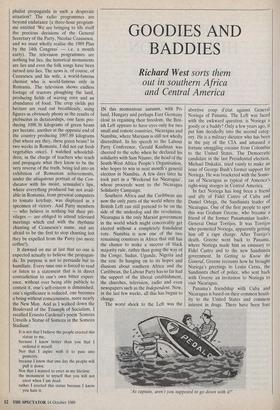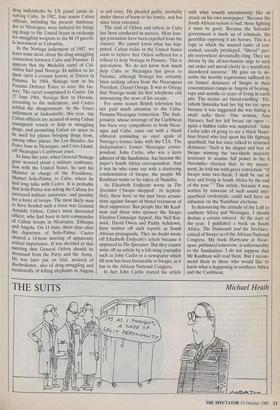GOODIES AND BADDIES
Richard West sorts them
out in southern Africa and Central America
IN this momentous autumn, with Po- land, Hungary and perhaps East Germany close to regaining their freedom, the Brit- ish Left appears to have eyes only for two small and remote countries, Nicaragua and Namibia, where Marxism is still not wholly discredited. In his speech to the Labour Party Conference, Gerald Kaufman was cheered to the echo when he declared his solidarity with Sam Njumo, the head of the South-West Africa People's Organisation, who hopes to win in next month's general election in Namibia. A few days later he took part in a 'Weekend for Nicaragua', whose proceeds went to the Nicaragua Solidarity Campaign.
• Southern Africa and the Caribbean are now the only parts of the world where the British Left can still pretend to be on the side of the underdog and the revolution. Nicaragua is the only Marxist government in the world which might conceivably get elected without a completely fraudulent vote. Namibia is now one of the two remaining countries in Africa that still has the chance to make a success of black majority rule, rather than going the way of the Congo, Sudan, Uganda, Nigeria and the rest. In hanging on to its hopes and illusions about southern Africa and the Caribbean, the Labour Party has so far had the support of the liberal establishment, the churches, television, radio and even newspapers such as the Independent. Now, in the last few weeks, all this has begun to change.
The worst shock to the Left was the abortive coup d'etat against General Noriega of Panama. The Left was faced with the awkward question: is Noriega a goody or a baddy? Only a few years ago, it put him decidedly into the second categ- ory. He is a military dictator who has been in the pay of the CIA and amassed a fortune smuggling cocaine from Colombia to the United States. The Democratic candidate in the last Presidential election, Michael Dukakis, tried vainly to make for issue of George Bush's former support for Noriega. He was bracketed with the ,Sonio- zas of Nicaragua as typical of America's right-wing stooges in Central America.
In fact Noriega has long been a friend and ally of Fidel Castro of Cuba and Daniel Ortega, the Sandinista leader of Nicaragua. One of the first people to spot this was Graham Greene, who becaMe a friend of the former Panamanian leader, General Omar Torrijos. It was Torrijos who promoted Noriega, apparently getting him off a rape charge. After Torrijo's death, Greene went back to Panama, where Noriega made him an emissary to Fidel Castro and to the new Sandinista government. In Getting to KnOw the General, Greene recounts how he brought Noriega's greetings to Lenin Cerna, the Sandinista chief of police, who sent back with Greene an invitation to Noriega to visit Nicaragua.
Panama's friendship with Cuba and Nicaragua is based on their common hostil- ity to the United States and common interest in drugs. There have been four
As captain, aren't you supposed to go down with it?' drug indictments by US grand juries in- volving Cuba. In 1982, four senior Cuban officials, including the present Ambassa- dor to Nicaragua, were indicted for bring- ing drugs to the United States in exchange for smuggling weapons to the M-19 guerril- la movement in Colombia.
In the Noriega indictment of 1987, we learn some more about the drug-smuggling connection between Cuba and Panama. It appears that the Medellin cartel of Col- ombia had paid Noriega $4 million to let them open a cocaine factory at Darien in Panama. In 1984, Noriega sent in his Panama Defence Force to seize the fac- tory. The cartel complained to Castro. On 27 June 1984, Noriega flew to Havana, according to the indictment, and Castro settled the disagreement. In the Vesco indictment at Jacksonville, this year, top Cuban officials are accused of using Cuban coastguard vessels to help in smuggling drugs, and permitting Cuban air space to be used for planes bringing drugs from, among other places, the Los Brasiles Air Force base in Nicaragua, and Corn Island, off Nicaragua's Caribbean coast. In June this year, when General Noriega grew worried about a military confronta- tion with the United States, he sent his Minister in charge of the Presidency, Manuel Solis-Palma, to Cuba, where he had long talks with Castro. It is probable that Solis-Palma was asking the Cubans for increased military assistance, and possibly for a force of troops. The most likely man to have headed such a force was General Arnaldo Ochoa, Cuba's most decorated officer, who had been in turn commander of Cuban troops in Nicaragua, Ethiopia and Angola. On 14 June, three days after the departure of Solis-Palma, Castro chaired a 14-hour meeting of apparently critical importance. It was decided at that meeting that General Ochoa should be dismissed from the Party and the Army. He was later put on trial, accused of disobedience, also of drug-smuggling and incidentally of killing elephants in Angola to sell ivory. He pleaded guilty, probably under threat of harm to his family, and has since been executed.
The trial of Ochoa and others in Cuba has been conducted in secrecy. Most fore- ign journalists have been expelled from the country. We cannot know what has hap- pened. Cuban exiles in the United States seem to believe that Ochoa suffered for a refusal to help Noriega in Panama. This is speculation. We do not know how much help Cuba or Nicaragua has given to Panama, although Noriega has certainly been seeking advice from the Nicaraguan President, Daniel Ortega. It was to Ortega that Noriega made his first telephone call announcing the news of his escape.
For some reason British television has not paid much attention to the Cuba- Panama-Nicaragua connection. The Inde- pendent, whose coverage of the Caribbean has been very sympathetic to both Nicar- agua and Cuba, came out with a bland editorial reminding us once again of Noriega's former links with the CIA. The Independent's former Nicaragua corres- pondent, John Carlin, who was a keen admirer of the Sandinistas, has become the paper's South Africa correspondent. And it was he who came out with a shattering condemnation of Swapo, the people Mr Kaufman wants to be rulers of Namibia.
As Elizabeth Endycott wrote in The Spectator ('Swapo shopped', 16 Septem- ber), there have in the past been accusa- tions against Swapo of brutal treatment of their supporters. But people like Mr Kauf- man and those who sponsor the Swapo Election Campaign Appeal, like Neil Kin- nock , David Owen and Paddy Ashdown, have written off such reports as South African propaganda. They no doubt wrote off Elizabeth Endycott's article because it appeared in The Spectator. But they cannot write off an article by a left-wing journalist such as John Carlin in a newspaper which till now has been favourable to Swapo, as it has to the African National Congress.
In fact John Carlin started his article with what sounds uncommonly like an attack on his own newspaper: 'Because the South African system is bad, those fighting it must be good. Because the Salvador government is made up of criminals, the guerrillas opposing it are heroes. This is a logic to which the massed ranks of con- cerned, socially privileged, "liberal" peo- ple everywhere devoutedly cling. They are driven by the all-too-human urge to seek out order and moral clarity in a manifestly disordered universe.' He goes on to de- scribe the horrific experiences suffered by six former detainees of Swapo in their concentration camps in Angola of beating, rape and months or years of living in earth pits. The stories are blood-curdling: 'Eli- zabeth Simasiku had her big toe cut open because it was suggested she was hiding a small radio there. One woman, Ana Harases, had her left breast cut open again a hidden radio was suspected.' John Carlin talks of going to see a black Nami- bian friend who had spent his life fighting apartheid, but has since talked to returned detainees: 'Such is his disgust and fear of Swapo winning the two-thirds majority necessary to assume full power in the 6 November election that, to my amaze- ment, he told me with grave conviction: "If Swapo wins two-thirds, I shall be out of here and living in South Africa by the end of the year."' This article, because it was written by someone of such sound anti- apartheid credentials, could well have an influence on the Namibian elections.
In denouncing the attitude of the Left to southern Africa and Nicaragua, I should declare a certain interest. At the start of the year, I published a book on South Africa, The Diamonds and the Necklace, critical of Swapo as of the African National Congress. My book Hurricane in Nicar- agua, published tomorrow, is unfavourable to the Sandinistas. I do not suppose that Mr Kaufman will read them. But I recom- mend them to those who would like to know what is happening in southern Africa and the Caribbean.



























































 Previous page
Previous page